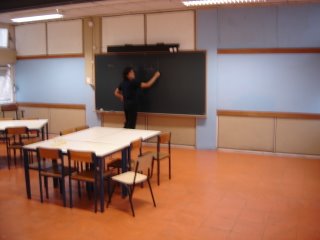Nem todas as comissões independentes são jobs for the boys. Hás as que fazem estudos valiosos, aproveitemo-los!
O "National Reading Panel" afirma que a combinação de metodologias é a forma mais eficaz de ensinar crianças a ler. Eu diria que é também a forma de proporcionar um ensino adequado a cada grupo de crianças e um modo de os ensinar a ler bem.
Ora, isto traz problemas às professoras primárias-domésticas, porque deixam de ter tempo para todos os afazeres da casa e da família.
"In the largest, most comprehensive evidenced-based review ever conducted of research on how children learn reading, a Congressionally mandated independent panel has concluded that the most effective way to teach children to read is through instruction that includes a combination of methods."
The panel determined that effective reading instruction includes teaching children to break apart and manipulate the sounds in words (phonemic awareness), teaching them that these sounds are represented by letters of the alphabet which can then be blended together to form words (phonics), having them practice what they've learned by reading aloud with guidance and feedback (guided oral reading), and applying reading comprehension strategies to guide and improve reading comprehension.
The work of this panel was guided by two unique actions. First, the panel developed a set of rigorous scientific standards to evaluate the research on the effectiveness of different instructional approaches used in teaching reading skills. Second, the work of the panel was conducted in a public forum, which allowed for public input at all of its meetings.
"For the first time, we now have guidance-based on evidence from sound scientific research-on how best to teach children to read," said Duane Alexander, M.D., Director of the National Institute of Child Health and Human Development (NICHD), which supports research in reading and learning. "The panel's rigorous scientific review identifies the most effective strategies for teaching reading."
The National Reading Panel was established in response to a 1997 congressional directive. Specifically, Congress asked the Director of the NICHD, in consultation with the U.S. Secretary of Education, Richard W. Riley, to convene a national panel to review the scientific literature and determine, based on that evidence, the most effective ways to teach children to read. The Panel is composed of 14 individuals and includes leading scientists in reading research, representatives of colleges of education, reading teachers, educational administrators, and parents. The report, along with more information about the National Reading Panel, is available at the panel's website, http://www.nationalreadingpanel.org.
The NICHD will undertake an aggressive effort to distribute the report and its findings to policy makers, educators, and parents. The NICHD will collaborate in these efforts with the National Institute for Literacy and the Public Libraries Association.
For its review, the panel selected research from the approximately 100,000 reading research studies that have been published since 1966, and another 15,000 that had been published before that time. Because of the large volume of studies, the panel selected only experimental and quasi-experimental studies, and among those considered only studies meeting rigorous scientific standards in reaching its conclusions.
The panel's review focused on the following areas: alphabetic (phonemic awareness and phonics instruction), reading fluency, reading comprehension, teacher education, and computer technology.
Phonemic awareness is knowledge that spoken words are made up of tiny segments of sound, referred to as phonemes. For example, the words "go" and "she" each consists of two phonemes. Phonemic awareness is often confused with phonics, which refers to the process of linking these sounds to the symbols that stand for them, the letters of the alphabet. A comprehensive explanation of these two concepts is available in the NICHD publication, Understanding Why Children Succeed or Fail at Reading.
The panel found that the research conducted to date strongly supports the concept that explicitly and systematically teaching children to manipulate phonemes significantly improves children's reading and spelling abilities. The evidence for this is so clear cut that this method should be an important component of classroom reading instruction.
The panel also concluded that the research literature provides solid evidence that phonics instruction produces significant benefits for children from kindergarten through 6th grade and for children having difficulties learning to read. The greatest improvements in reading were seen from systematic phonics instruction. This type of phonics instruction consists of teaching a planned sequence of phonics elements, rather than highlighting elements as they happen to appear in a text. Here again, the evidence was so strong that the panel concluded that systematic phonics instruction is appropriate for routine classroom instruction.
For children with learning disabilities and children who are low achievers, systematic phonics instruction, combined with synthetic phonics instruction produced the greatest gains. Synthetic phonics instruction consists of teaching students to explicitly convert letters into phonemes and then blend the phonemes to form words. Moreover, systematic synthetic phonics instruction was significantly more effective in improving the reading skills of children from low socioeconomic levels. Across all grade levels, systematic synthetic phonics instruction improved the ability of good readers to spell.
The panel noted that, because children vary in reading ability and vary in the skills they bring to the classroom, no single approach to teaching phonics could be used in all cases. For this reason, it is important to train teachers in the different kinds of approaches to teaching phonics and in how to tailor these approaches to particular groups of students.
The panel also concluded that guided oral reading is important for developing reading fluency-the ability to read with efficiency and ease. In guided oral reading, students read out loud, to either a parent, teacher or other student, who corrects their mistakes and provides them with other feedback. Specifically, guided oral reading helped students across a wide range of grade levels to learn to recognize new words, helped them to read accurately and easily, and helped them to comprehend what they read.
By contrast, the panel was unable to determine from the research whether reading silently to oneself helped to improve reading fluency. Although it makes sense that silent reading would lead to improvements in fluency, and the panel members did not discourage the practice, sufficient research to conclusively prove this assumption has not been conducted. Literally hundreds of studies have shown that the best readers read silently to themselves more frequently than do poor readers, the panel members wrote. However, these studies cannot distinguish whether independent silent reading improves reading skills or that good readers simply prefer to read silently to themselves more than do poor readers. The panel recommended that if silent reading is used as a classroom technique, intended to develop reading skills and fluency, it should be done in combination with other types of reading instruction, such as guided oral reading.
To determine how children best learn to comprehend what they read, the panel reviewed studies of three areas regarded as essential to developing reading comprehension: vocabulary development, text comprehension instruction, and teacher preparation and comprehension strategies instruction.
Although the best method or combination of methods for teaching vocabulary has not yet been identified, the panel review uncovered several important implications for teaching reading. First, vocabulary should be taught both directly-apart from a larger narrative or text-and indirectly-as words are encountered in a larger text. Repetition and multiple exposure to vocabulary words will also assist vocabulary development, as will the use of computer technology. The panel emphasized that instructors should not rely on a single method for teaching vocabulary, but on a combination of methods.
Likewise, the panel also found that reading comprehension of text is best facilitated by teaching students a variety of techniques and systematic strategies to assist in recall of information, question generation, and summarizing of information. The panel also found that teachers must be provided with appropriate and intensive training to ensure that they know when and how to teach specific strategies.
With respect to the overall preparation of teachers, the panel noted that existing studies showed that training both new and established teachers generally produced higher student achievement, but the research in this area is woefully inadequate to draw clear conclusions about what makes training most effective. More quality research on teacher training is one of the major research needs identified by the panel.
Finally, the panel examined the use of computer technology to teach reading. The panel noted that there are too few definitive studies to draw firm conclusions, but that the available information suggests that it is possible to use computer technology for reading instruction. Although not directly applicable to reading instruction, the use of hypertext-highlighted text that links to definitions or related text-may be a useful learning aid in the classroom. Moreover, the use of computers as word processors may also help students learn to read, as reading instruction is most effective when combined with writing instruction."
Artigo a traduzir, quando o meu quarteirão de meninos de 5 e 6 anos de idade me deixarem respirar... porque até lá sou uma barata-tonta que corre atrás deles e diz "vá lá, tem calma"; "lembram-se da regra que definimos ali?"; "pois, assim não se consegue trabalhar, não é? Está muito barulho", ora sussurrando, ora gritando como eles, porque se estou a ficar rouca ao fim de uma semana de aulas, significa que não andarei só a sussurrar. O Outono faz-me destes males, por si só, mas sei que ando a aumentar o volume, coisa que odeio. Mea culpa.



